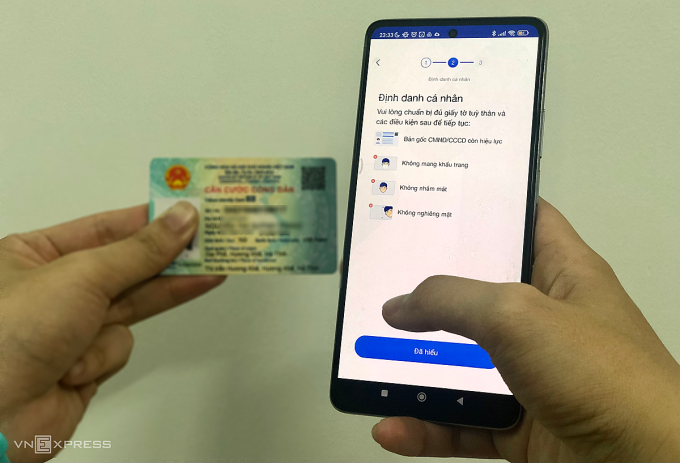Some banks have begun piloting customer authentication through chip-embedded citizen identification cards connected to national population data.
On June 8, Asia Commercial Bank (ACB) announced the deployment of chip-based citizen identification authentication service, through a partnership with FPT Information System Company (FPT IS).
In July, the bank will pilot the online credit card opening feature, using chip-based citizen identification authentication. Authentication from population data with other features such as account opening, lending, etc., according to ACB leaders, will be applied according to a roadmap, ensuring that the application does not "suddenly affect" the customer experience.
At the end of May, Vietnam Public Bank (PVcomBank) also joined hands with Quang Trung Digital Technology and Services Company to apply chip-embedded citizen identification cards to open accounts using the electronic identification method (eKYC).
This move is part of the data exploitation plan recently mentioned by the State Bank. In the near future, counter transactions and online payments are expected to require customer authentication using chip-embedded citizen identification cards, contributing to thoroughly solving the problem of renting, borrowing, and selling bank accounts that has existed for many years.

Open a bank account using electronic identification (eKYC). Photo: Quynh Trang
The "explosion" of eKYC electronic identification in recent years has helped customers make transactions conveniently without having to go directly to the bank. By the end of 2022, there will be 11.9 million payment accounts opened using electronic identification and in operation.
However, electronic identification still encounters some problems such as the system not recording or incorrectly recording information due to blurred or old identification documents, or the risk of criminals intentionally forging documents to commit financial fraud.
The biggest problem with banks' electronic identification, according to Mr. Phan Thanh Toan, Director of the ID Check project at FPT IS, is the difficulty in determining whether a customer's identity documents are real or fake. Many scammers take advantage of eKYC loopholes to use expired documents or photocopied documents, replace photos... when opening accounts and making transactions. "The forms of forgery are even so sophisticated that when transacting at the counter, bank tellers have difficulty identifying fake documents," said Mr. Toan.
The data of 80 million citizen identification cards is encrypted and intact with digital signatures, and cannot be completely faked. Using artificial intelligence (AI) combined with accurate data sources from national population data, according to Mr. Toan, will solve this problem, helping to identify customers with almost absolute accuracy.
Accurate customer identification, especially when transferring money online, is of great significance in eliminating the widespread online money fraud that is currently taking place. In many recent scams, even though the victims know the phone number and the account to which the money is being sent, it is still difficult to track down the person behind it because most of them use fake information, including junk SIM cards and junk bank accounts. If we can address the issue of bank accounts that are not in the owner's name, online fraud can be reduced by 80-90%, according to the Information Security Department.
Quynh Trang
Source link












































Comment (0)